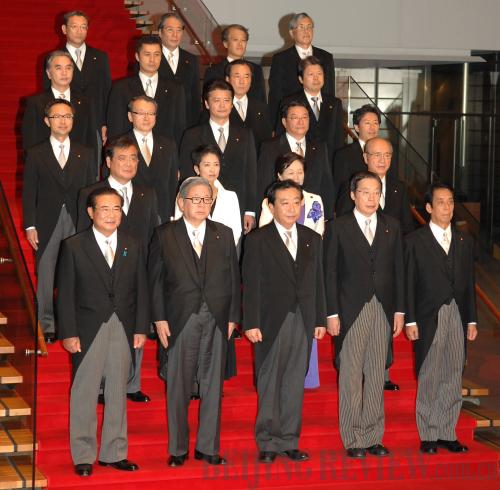|
 |
|
MORE NEW FACES: Yoshihiko Noda's cabinet makes its first group appearance in Tokyo on September 2 (XINHUA) |
The DPJ also showed a positive attitude on historical issues during Kan's time. Kan required that all his cabinet members not visit the controversial Yasukuni Shrine, which commemorates Japanese war dead, including Class A war criminals in World War II, on August 15, the date Japan announced its surrender in 1945.
Kan made a telephone call to Chinese Premier Wen Jiabao a week after he assumed power in June 2010, inaugurating the hotline between the two countries' heads of government. He also named Uichiro Niwa, former President of trading company Itochu Corp., as Japanese ambassador to China, intending to show an emphasis on promoting bilateral trade and economic relations. Niwa is experienced in international business and has good connections with Chinese political and business circles.
But things changed after the DPJ lost its majority in last July's upper house election. Kan decided to cement the DPJ's ruling position by adjusting diplomatic policy. He abandoned the independent and balanced diplomatic strategy, restored the U.S.-Japanese alliance, focused on Japanese-South Korean relations as the core of Japan's Asian diplomacy, and kept a distance from China.
The Kan government also mounted pressure on North Korea over the nuclear issue, North Korea's abductions of Japanese citizens in the 1970s and the 1980s and the sinking of South Korea's Cheonan warship in March 2010, for which Seoul put the blame on Pyongyang. These steps refocused Japan on security cooperation between Tokyo, Washington and Seoul.
Washington weighed much more on Kan's diplomatic scales. His China policy was adjusted along with his U.S. policy. Also, he treated the U.S.-Japanese alliance as a tool to hold down China's increasing power. For example, Kan once declared that the U.S. military presence in Japan is playing a role in deterring China. He also regarded China as a threat that Japan should be alert of, which brought the DPJ diplomatic strategy in line with that of the LDP. Thereafter, many Japanese politicians joined the U.S. chorus of the "China threat theory."
On September 7, 2010, Japanese coast guards captured a Chinese fishing boat near the Diaoyu Islands in the East China Sea. Japan illegally arrested the captain and began an investigation of the incident. It was not until two weeks later that the Japanese authorities finally released the captain after intensive diplomatic mediation. Japan's unusually harsh stance on this issue reflected the Kan administration's changed policy.
Relying on the U.S.-Japanese alliance, the Kan administration sought to build a strategic alliance to hedge against China through cooperation with other neighbors. This policy resulted in growing discord in the two countries' relations, which greatly shook the foundation of their mutual trust.
Noda's direction uncertain
Noda became prime minister at a crucial moment. Since the DPJ needs to iron out internal disputes among different factions to cement its ruling position and lead Japan in addressing the aftermath of the devastating earthquake and tsunami in March, diplomacy is not Noda's most urgent task. Maintaining the DPJ's ruling position and promoting post-disaster recovery are more important to him.
Most likely, the Noda cabinet will follow Kan's policy and consider its relationship with Washington as its top diplomatic priority. But Noda definitely can do more on the Sino-Japanese relationship. Now he must make a choice between Kan's strategy of deterring China and building a stable partnership with China.
Japan's economy is at a key point. China has become Japan's top trade partner and importer, so a tough policy on China is not in accord with Japan's interests. Even if Noda hopes to strengthen Japan's alliance with Washington, as a former finance minister, he will not ignore China's role in helping revive the Japanese economy. But wrong opinions on historical issues and China's future development may bring uncertainties to Noda's future policy on China.
The next year will mark the 40th anniversary of the normalization of Sino-Japanese diplomatic relations, which could mean a new opportunity to improve their bilateral relationship. But the damage caused by Japan's interception of a Chinese fishing boat off the Diaoyu Islands last year has yet to be mended.
Also, Washington never stops deploying its strategy of balancing China's influence in East Asia. As long as disputes between China and Japan exist, Washington can use these disputes to work for its East Asian strategy.
Noda's first priorities will be to consolidate the position of the DPJ and his own status as prime minister. If he can do them, he will be in a better position to promote post-earthquake reconstruction and rebuild Japan's stagnant economy. Strengthening cooperation with emerging economies including China can help Noda accomplish these goals.
The author is an associate research fellow with the China Institute of International Studies | 